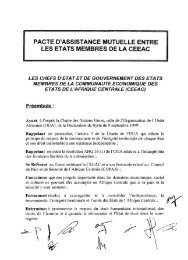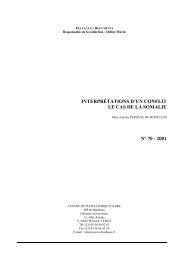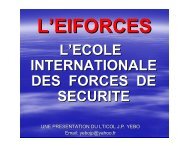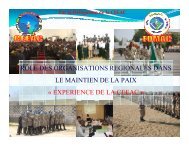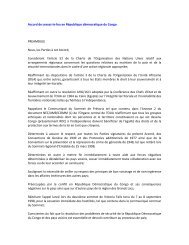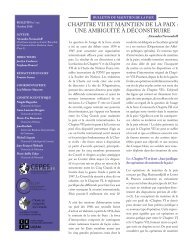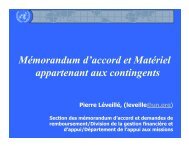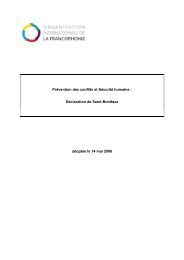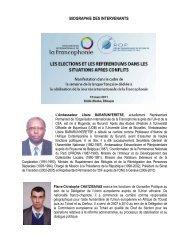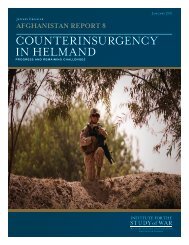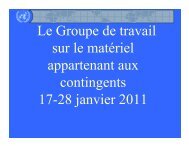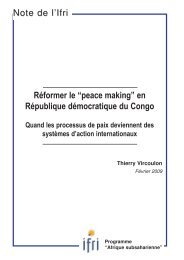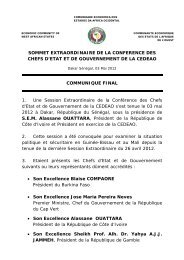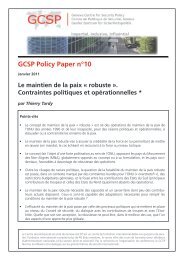Comprehensive Review of the Whole Question of Peacekeeping ...
Comprehensive Review of the Whole Question of Peacekeeping ...
Comprehensive Review of the Whole Question of Peacekeeping ...
You also want an ePaper? Increase the reach of your titles
YUMPU automatically turns print PDFs into web optimized ePapers that Google loves.
A/57/767<br />
42. Since <strong>the</strong> end <strong>of</strong> <strong>the</strong> Cold War, <strong>the</strong>re has been an increase in <strong>the</strong> number <strong>of</strong><br />
complex peacekeeping operations. The Special Committee notes that <strong>the</strong> Security<br />
Council has recently mandated peacekeeping operations that have included, in<br />
addition to <strong>the</strong> traditional tasks <strong>of</strong> monitoring and reporting, a number <strong>of</strong> o<strong>the</strong>r<br />
mandated activities. In that regard, <strong>the</strong> Committee stresses <strong>the</strong> importance <strong>of</strong> an<br />
effective Department <strong>of</strong> <strong>Peacekeeping</strong> Operations that is efficiently structured and<br />
adequately staffed.<br />
43. The Special Committee pays tribute to <strong>the</strong> men and women who have served<br />
and continue to serve in peacekeeping operations for <strong>the</strong>ir high level <strong>of</strong><br />
pr<strong>of</strong>essionalism, dedication and courage. Particular tribute is due to those who have<br />
given <strong>the</strong>ir lives for <strong>the</strong> maintenance <strong>of</strong> peace and security.<br />
44. The Special Committee stresses <strong>the</strong> importance <strong>of</strong> consistently applying <strong>the</strong><br />
principles and standards it has set forth for <strong>the</strong> establishment and conduct <strong>of</strong><br />
peacekeeping operations and emphasizes <strong>the</strong> need to continue to consider those<br />
principles, as well as definitions <strong>of</strong> peacekeeping, in a systematic fashion. New<br />
proposals or conditions concerning peacekeeping operations should be discussed in<br />
<strong>the</strong> Committee.<br />
B. Guiding principles, definitions and implementation <strong>of</strong> mandates<br />
45. The Special Committee stresses that peacekeeping operations should strictly<br />
observe <strong>the</strong> purposes and principles enshrined in <strong>the</strong> Charter. It emphasizes that<br />
respect for <strong>the</strong> principles <strong>of</strong> sovereignty, territorial integrity and political<br />
independence <strong>of</strong> States and non-intervention in matters that are essentially within<br />
<strong>the</strong> domestic jurisdiction <strong>of</strong> any State is crucial to common efforts, including<br />
peacekeeping operations, to promote international peace and security.<br />
46. The Special Committee believes that respect for <strong>the</strong> basic principles <strong>of</strong><br />
peacekeeping, such as <strong>the</strong> consent <strong>of</strong> <strong>the</strong> parties, impartiality and <strong>the</strong> non-use <strong>of</strong><br />
force except in self-defence, is essential to its success.<br />
47. The Special Committee is <strong>of</strong> <strong>the</strong> view that peacekeeping operations should not<br />
be used as a substitute for addressing <strong>the</strong> root causes <strong>of</strong> conflict. Those causes<br />
should be addressed in a coherent, well-planned, coordinated and comprehensive<br />
manner, using political, social and developmental instruments. Consideration should<br />
be given to ways in which those efforts can continue without interruption after <strong>the</strong><br />
departure <strong>of</strong> a peacekeeping operation, so as to ensure a smooth transition to lasting<br />
peace and security.<br />
48. The Special Committee stresses that <strong>the</strong> Security Council has <strong>the</strong> primary<br />
responsibility for <strong>the</strong> maintenance <strong>of</strong> international peace and security, pursuant to<br />
Article 24 <strong>of</strong> <strong>the</strong> Charter. The Committee notes <strong>the</strong> statements by <strong>the</strong> President <strong>of</strong><br />
<strong>the</strong> Security Council <strong>of</strong> 29 December 1998 (S/PRST/1998/38) and 20 February 2001<br />
(S/PRST/2001/5) with regard to <strong>the</strong> inclusion, as appropriate, <strong>of</strong> peace-building<br />
elements in <strong>the</strong> mandates <strong>of</strong> peacekeeping operations, with a view to ensuring a<br />
smooth transition to a successful post-conflict phase. The Committee stresses <strong>the</strong><br />
importance <strong>of</strong> those elements being explicitly defined and clearly identified before<br />
<strong>the</strong>y are incorporated into <strong>the</strong> mandates <strong>of</strong> peacekeeping operations, whenever<br />
appropriate. The Committee emphasizes <strong>the</strong> role <strong>of</strong> <strong>the</strong> General Assembly in <strong>the</strong><br />
formulation <strong>of</strong> post-conflict peace-building activities.<br />
6



